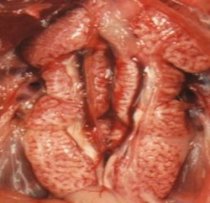Pathogenesis of Infectious Bronchitis (IB)
The Infectious Bronchitis Virus affects the respiratory tract and the uro‐genital tract.
Spread of the virus
IB is highly contagious. The incubation period is relatively short (18 ‐ 36 hours), with the disease spreading through an entire flock within one or two days. The IB virus is spread horizontally by aerosol transmission (sneezing), through contaminated organic material, drinking water and equipment. So far, vertical transmission (from the hen to their progeny through the egg) has not been shown to be important. However, surface contamination of eggs with the IB virus is a possible way by which the virus can be spread in Hatcheries or Egg Packing Stations.
“Renal damage associated with different IB strains is an increasingly important feature of IB infections, especially in broilers.“
Pathogenesis
Infectious bronchitis virus initially infects and replicates in the upper‐respiratory tract causing the loss of protective cells lining the sinuses and trachea. After a brief viraemia, the virus can be detected in the kidneys, reproductive tract (Read more about variant D388 (QX)), and caecal tonsils.

Swollen pale kidneys in a chicken infected with IBV.
Read more.
Some strains of IBV, which are referred to as nephropathogenic are known to cause lesions in the kidney. Renal damage associated with different IB strains is an increasingly important feature of IB infections, especially in broilers.
Read more.
